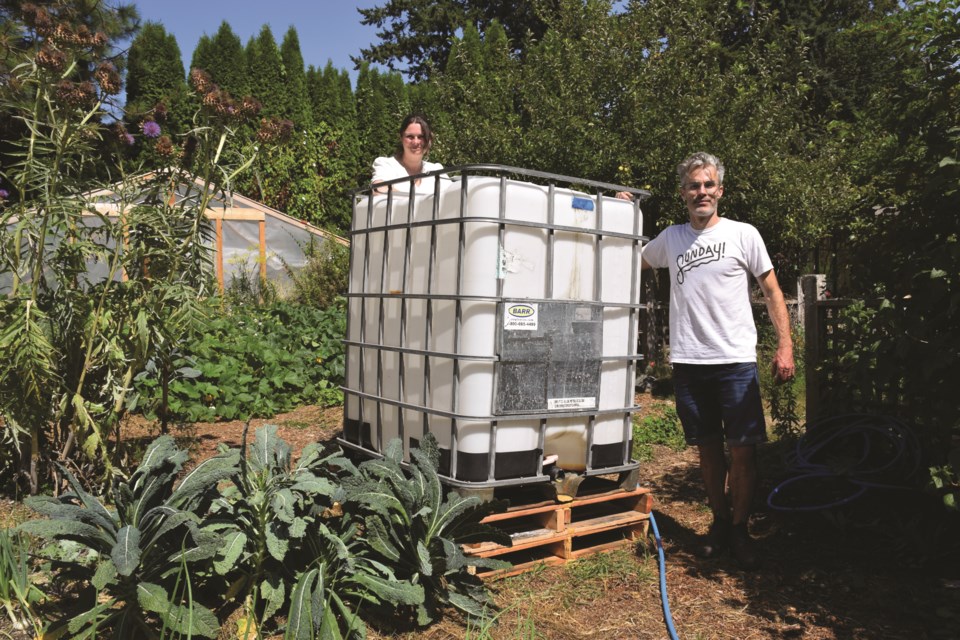A week after Stage 4 water restrictions banning outdoor use of treated water was declared for much of the Sunshine Coast, the regional district granted a temporary exemption for registered farms.
At an emergency meeting on Aug. 17, Sunshine Coast Regional District (SCRD) staff reported that at least 16 farms have Farm Class status on the Chapman water system, and those 16 used approximately 179 cubic metres of water per day in July.
For the two-week exemption period, that equates to about 3,329 cubic metres of water, or a seven-hour reduction in availability for water on the entire system, which directors determined would not make a substantial difference to community usage.
Elphinstone director Donna McMahon told the board in a special meeting on Aug. 16 that the two-week period was suggested to help farmers get through the most productive growing weeks of the year, and provide time for them to arrange contingency plans should the water shortage continue.
The exemption does not apply to hobby farms, community gardens or backyard gardens.
The last time the SCRD granted local farmers an exemption to water restrictions was in 2015. A request for an exemption for farmers was denied in 2018.
Stage 4 severe water restrictions came into effect at noon on Aug. 10. July and August are typically the busiest – and most lucrative – months for food producers, and this is the earliest the SCRD has ever implemented Stage 4.
The next day, Aug. 11, the Sunshine Coast Farmers Institute (SCFI) sent an email to the SCRD asking for an exemption from the restrictions for soil-based commercial food farmers, calling the restrictions on indoor versus outdoor water use “arbitrary.”
At Hough Heritage Farm in Gibsons, SCFI president Raquel Kolof told Coast Reporter that the profit margins for food growing are very narrow. Not being able to water crops can result in the loss of years of work, she said.
“That’s an issue because we’re going to lose local farmers, which we can’t afford to lose. We’re going to lose fresh, local, nutrient-dense food, which we can’t afford to lose. And we’re going to lose living soil,” Kolof said, adding there’s an environmental impact to consider as well.
Within days of Stage 4 coming into effect, One Straw Society and Persephone Brewing Company, with support from the Sunshine Coast Credit Union, partnered to coordinate delivery or filling of totes containing 1,000 litres of water from businesses or private wells to farmers in need. All of the local breweries and cideries agreed to share their clean wastewater and around 13 private wells (including Kolof’s) have stepped up as part of the initiative called Project Water Box, Cassandra Fletcher, the executive director of One Straw Society, said.
More than 100 people had applied for the community initiative as of Aug. 17, Fletcher said, and only two of them are registered and therefore eligible for the exemption. Most of the applicants are not registered or commercial farms, such as the harvest gardens that support the food banks or the One Tiny Farm community garden in Roberts Creek.
As a result, Project Water Box will be continuing as needed despite the exemption, she said.
One Straw chose not to petition for an exemption, as the society’s focus is working toward equitable water restrictions based on metering, regardless of whether the water is used indoors or outdoors.
“I think that’s what’s really tugging at people the most, and doesn’t sit well, is this sort of discriminatory treatment of food, simply because it’s outdoor,” Kolof said, while other businesses that operate indoors can continue as usual.
The Water Rates and Regulations Bylaw No. 422 is currently under review by SCRD staff. Suggestions to update the bylaw – which may include indoor and outdoor restrictions – are expected to come back to the board in spring 2022, the SCRD’s general manager of infrastructure, Remko Rosenboom, told Coast Reporter.
For Hannah Lewis at Grounded Acres Organic Farm in Elphinstone, the outdoor water ban meant her farm has spent the past week “scrambling to find Band-Aid solutions,” she told Coast Reporter on Aug. 17.
While Grounded Acres had full storage tanks of water when restrictions came into effect, their supply would only last about a week. They came up with a plan identifying which crops to sacrifice and which to salvage. With the help of Project Water Box, Grounded Acres has received a few truckloads of clean wastewater from Persephone – but Lewis said they’d need 24 trucks a week to meet their baseline needs.
The farm is part of One Straw’s subsidized food box program, and customers paid in advance. One-third of the boxes are subsidized, and provided for free to those in need.
When asked about the proposed exemption prior to its adoption, Lewis said, “That would be fantastic to get us through, hopefully, the rest of the dry season… A lot of our big field crops, we would be able to get some nice harvest off of them, but it would not give us any sense of security for seasons to come.”
Kolof thanked the board at the Aug. 17 emergency meeting, after the exemption was adopted.
“We need to look after our food here on the Sunshine Coast,” SCRD chair Lori Pratt responded, as she began to tear up.
At the meeting, farmers were reminded to contact the SCRD to confirm their status as eligible for the exemption prior to using outdoor water. They will be able to access the Chapman water system until end of day Aug. 31.
Before the meeting concluded, a farmer had already called the SCRD to confirm they were allowed to start watering their crops again.



